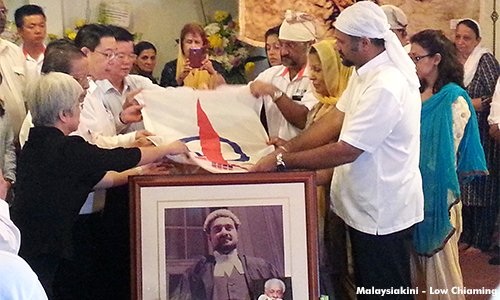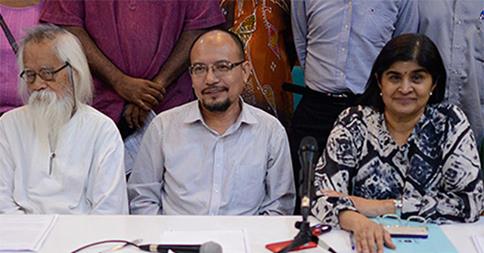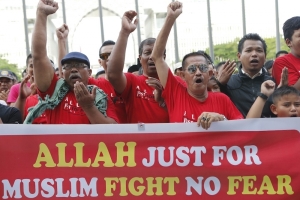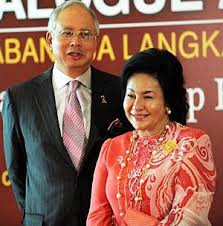April 23, 2014
Karpal Singh: A Political Man of his Times
Bridget Welsh@http://www.malaysiakini.com
TRIBUTE: Much has been written about the recently deceased Karpal Singh.
His skills as a lawyer, his fight for basic rights and contributions to the law, his commitment to his family and his struggle for ordinary people as a humanitarian are just some of the themes raised in the many eulogies and reflections in the past few days since he and his friend and assistant Michael Cornelius lost their lives.

Karpal had never insulted hudud. He had only said that it was against the Constitution.
The reactions from ordinary Malaysians have reaffirmed the spirit of dignity and humanity that are an integral part of the national character and stand in stark contrast to the uncouth provocative remarks of a handful of individuals who, blinded by insecurity and hubris, revealed how far they have deviated from common decency.
I knew Karpal Singh as a politician, and the remarks that follow are some of my observations on his important role in Malaysian political life and his political legacy.
A true Malaysian nationalist
Karpal’s entry into politics in 1969 coincided with a tumultuous time in Malaysian politics. He had been socialised in the exciting decade of the 1960s, when student politics was active and universities were centres to discuss and debate ideas – sadly an era now long gone.
He was among a generation of early Malaysian nationalists deeply committed to the country and the very principles that were the bedrock of the nation at independence, particularly the Federal Constitution.
His staunch defence of the legal foundation of Malaysia throughout his lifetime was an extension of his deep love for Malaysia and the ideals (and idealism) of a decade where rights were fought for and protected.
The 1960s was an era where a son of a watchman from any race could become a lawyer with hard work and skill. Karpal Singh emerged in public life to embody the promise of a new nation in a time of high social mobility and opportunities across ethnicity.
The other side
In making the decision to join and stay with the Democratic Action Party (DAP) after the wake of the May 1969 riots, Karpal chose a difficult path. Many leaders of his generation (and some parties at that time, including PAS and Gerakan) opted to join the Barisan Nasional, to work from inside the system to address the challenges of country, particularly ethnic tensions and development.
Karpal opted for the brave road of opposition, the political margins. He once shared with me the reasons for doing so, highlighting the importance of a loyal opposition for effective national governance. As a lawyer, he explained, it was necessary to have the other side, someone to offer a different point of view and to safeguard the system from potential abuses. I recall that he laughed when he stated that he also loved a good battle, even as the underdog.
Karpal Singh embraced his role as an opposition Member of Parliament, and used his knowledge of the law to shape debates. The Hansard of parliamentary debates of the 1970s reveal his rich contributions, where he questioned laws from the Universities and University Colleges Act to the Internal Security Act.
He avidly opposed many of the Bills that curtailed human rights at a time when legislation was introduced to limit political activism and freedom, and although many of these efforts were not successful, some amendments were adopted and importantly, issues of concern were put into the public arena.
His political statements in Parliament were not popular among some, but the contribution to the national debate in building Malaysia cannot be understated. An opposition has an important role to play in any political system, and Karpal was an integral leader in this effort.
Grudgingly, this consistency and commitment won him the respect of many in the system, many of whom he befriended. When the parliamentary debate was over, he often left those battles for the legislature behind and put aside differences to share a joke or banter.
This pattern of shared comradeship across the political aisle was shaped by his practice as a lawyer, where the legal fraternity focused their differences for the courtroom.
This practice of a quiet coffee became more difficult after Karpal’s tragic accident of 2005, but many across the political divide, in his generation in particular, recognised his practice of agreeing to disagree and appreciation of a shared fraternity of leaders working for Malaysia.
This was a time in Malaysian history where statesmanship in leadership was expected, sadly another era also gone.
A Defender of Democracy

It’s Dr Mahathir, not Karpal, who belittled hudud.
Karpal’s role in political life expanded in the 1980s during Dr Mahathir Mohamad’s tenure as prime minister, when Karpal took on battles to protect democratic governance. As the former prime minister weakened institutions and corruption became entrenched, Karpal took to the courtroom to challenge these practices.
One of the ironies of Karpal Singh’s role in politics is that he fought so hard to defend and strengthen an independent judiciary and was on the receiving end of its weaknesses and political co-option.
In this decade, his role in the 1988 North-South Expressway case was a landmark for public interest litigation.His challenges to corruption, abuse and the use of the ISA pitted him directly against Mahathir, who centralised political power and emphatically responded against opponents.
Among those Karpal challenged was also Anwar Ibrahim, then in Mahathir’s government, all on the grounds of checking the excesses of increasing executive centralisation.
The price to pay for challenging those in power is high in Malaysia, particularly so in the Mahathir (right) (and Najib Abdul Razak) years. Karpal spent years in prison, separated from his family after his arrest in Operation Lallang and his second passion in life, his work.
This opposition warrior was demonised, as another pattern in Malaysian politics set in – the more you challenge those in power, the tougher the response.
Mahathir’s era was the beginning of a nastiness of Malaysian political life, where mutual respect was not practised and the bounds of decency crossed. Personal attacks became commonplace – even among the opposition – as politics became deeply personalised and polarised.
The highest costs were absorbed by the individuals on the opposition frontline who challenged the system.
This was clearly evident in the 1999 trial of Anwar Ibrahim, where Karpal Singh played a role as part of the legal team. To stand in opposition was portrayed as the enemy of the state when in fact the opposite was true, as the efforts to insure justice was carried out were to protect the country’s integrity and fabric.
The Anwar trials have split Malaysia, as injustices have been carried out for the incumbent’s political survival. The prices that have been paid for taking Malaysia down this road of polarisation are blatantly evident in the loss of faith of the country’s institutions, the heightened use of racism and deep-seated anger that is an acid of pain among many in the country today.
Karpal fought the good fight in the courtroom and legislature, throughout hoping for justice with the knowledge of the difficult odds in the process. He remained committed to protecting the rule of law, even as many in the general public were losing their own faith.
His belief in the law as a means of protection for rights and justice never wavered, even as those in office and position failed in their responsibilities to act as the national guardian.
A secular constitutional champion
From the 1990s onwards two important themes emerged from Karpal Singh’s political activism. The first was a steadfast commitment to a secular Malaysia. This was tied to his deep-seated belief in religious freedom across the faiths.
He believed in the right of all citizens, including Muslims, to choose how they practised their religion and deeply worried about government regulation of these choices. As a member of a minority race, he was acutely aware of the effect of religious regulation, and worried about the constraints placed on the choices of ordinary citizens.
As a lawyer, he witnessed first-hand how the courtroom has become the battleground for religious rights, with the Constitution caught in the war. As I understood his explanation to me, his opposition to hudud was not against any faith but against giving the government authority to control and regulate faith.
A similar argument was made when he offered to defend the Singaporean Muslim girls in 2002, who were denied the right to wear the tudung (head scarf).
Karpal was one of the few in the political landscape who were willing to openly oppose the use of religion for political ends, and, as indicative of the viciousness of some of the responses when he passed on, he paid a price for it.
He was mistakenly portrayed as the main obstacle in Pakatan Rakyat to the implementation of Islamic law, but in reality, he was only one of those who was brave enough to voice his concerns publicly, as the debate over religion has become so politically poisonous and devoid of real, shared religious principles.
He believed in practising faith in his everyday life, and opposed the power of the government to take away the choice of citizens on how to practice their faith.
Another area where Karpal Singh was on the forefront was in calling for a responsible constitutional royalty, a call that led to his most recent conviction for sedition – for effectively stating a legal opinion. His political ally in this area was ironically initially Mahathir, who checked the powers of the royalty.
Since Mahathir’s formal departure from politics in 2003, the powers of the royalty have grown and it has become intertwined in political battles, from Perak to Selangor. While the royalty is the political institution that receives the highest respect among ordinary Malaysians in polling, it is also facing a battering among some in the general public who differ with the political positions and positioning in a highly polarised polity.
The 2014 sedition conviction of Karpal does not strengthen the royalty as an institution, and in the longer term, will open it to greater discord as it undermines the important role the royalty plays in representing the nation as a whole.
A loyal Opposition Voice
Some differ with the political positions Karpal took over the decades. Even among those sympathetic there were those critical of the timing and approach of his engagement. Yet, others were in full support of his steadfastness and defence of Malaysia’s national constitutional roots, and this admiration has been evident in the last few days.
He was the voice for the views that many in Malaysia’s silent majority, across the races, are afraid to state publicly. No one can question the pivotal role he has played in shaping Malaysian politics over the last four-and-a-half decades.
After 2008, it became harder for an opposition lawmaker to be purely an opponent, given the compromises needed for being in government at the state level and the challenges of an ideologically divided opposition coalition.
The current decade of Malaysian politics offers new obstacles in much muddier and murkier waters. The Najib government has not led in the areas of fairness and statesmanship, as shown in the examples of the efforts by the prosecution to put Karpal in jail.
Karpal stayed consistently principle-rooted in the muck that Malaysian politics has become today, and his role in fighting against injustice came to the fore again in his resistance to the political manipulation of institutions and violation of rights that have become part of Najib’s era.
Whether in the courtroom or in Parliament, Karpal’s contributions were a valuable national service that made the country stronger. He embodied the term loyal opposition in the interest of Malaysia.

DR BRIDGET WELSH is Associate Professor of Political Science at Singapore Management University. She can be reached at bwelsh@smu.edu.sg.
 Leaders of the Negara-Ku Movement
Leaders of the Negara-Ku Movement















 “I don’t want to sound churlish, particularly in this Christmas season of goodwill, but if you shake down the PM’s rhetoric, what have you left – syrupy sentiment and clichés that have little or no connection with realities on the ground.”
“I don’t want to sound churlish, particularly in this Christmas season of goodwill, but if you shake down the PM’s rhetoric, what have you left – syrupy sentiment and clichés that have little or no connection with realities on the ground.” “That he has to say a thing like that shows how far his office has tended to depart from a broad-gauged conception of its responsibilities that now there is the suspicion that it is enthralled to exclusivist notions of its actual import,” commented the Jesuit-trained prelate.
“That he has to say a thing like that shows how far his office has tended to depart from a broad-gauged conception of its responsibilities that now there is the suspicion that it is enthralled to exclusivist notions of its actual import,” commented the Jesuit-trained prelate. “All three were benign and reassuring in personal interaction with MCCBCHST and CFM councils but were something else when faced with testing circumstances involving religious matters as and when issues fizzled in the public arena,” recalled the Bishop.
“All three were benign and reassuring in personal interaction with MCCBCHST and CFM councils but were something else when faced with testing circumstances involving religious matters as and when issues fizzled in the public arena,” recalled the Bishop.